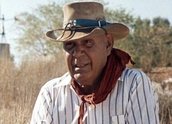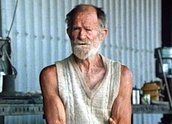


How the West was Lost (1987)
Synopsis
On May 1 1946 hundreds of Aboriginal pastoral station workers walked off sheep stations in the Pilbara region of north-west Western Australia. This was the beginning of an organised strike that officially lasted for three years but unofficially continued long after 1949. Over the next 30 years the strikers fought for recognition, fair wages and drew attention to the unfair treatment of Aboriginal people in the state. The story of the strike is told through re-enacted segments, oral testimony by some of the strikers and incorporates historical footage and official transcripts from the former Department of Native Affairs. It is narrated by a female voice-over.
Curator’s notes
In some ways, the Pilbara Strike can be seen as a simple industrial dispute, but more importantly it was about recognising Indigenous people as human beings entitled to the same rights as all other Australians. Many of the strikers who recount their experiences in this film refer to their feelings that they were treated as animals by the state and this was one of their main sources of trauma. Transcripts from the Department of Native Affairs, together with news articles from the time, place this significant event in the broader economic and political context of Western Australia. In the 1940s, Indigenous labour was essential to the economic progress of Western Australia and to the lives of pastoralists who ran stations on the land. But the Indigenous workers who tended the stations were either unpaid for their employment or given extremely low wages. Indigenous leaders Dooley Bin Bin and Clancy McKenna and pastoralist Don McLeod organised a walkout that covered a large area of the state’s north-west and involved hundreds of strikers. But while the 1946 strike officially lasted around three years, David Noakes’ documentary also highlights the fact that unofficially the strike continued to resonate into the 1980s for many. He covers the subsequent periods of the 1950s when many Aboriginal people began mining to make a living and the 1960s and 70s when some of them were able to buy back stations they had formerly worked on. People such as Don McLeod question just how far things had come even in the 1980s (see clip two).
Director, co-writer and co-producer David Noakes continued his interest in exploring Western Australia’s cultural history in 1992 with Bigger than Texas.
Secondary curator’s notes
by Romaine MoretonIn 1946 Indigenous men Dooley Bin Bin and Clancy McKenna and their non-Indigenous collaborator Don McLeod organised what would became known as the Pilbara Strike. A monumental effort resulted in a strike by 600 Aboriginal stockmen and women north of Western Australia.
How the West Was Lost deals with the determination of the Indigenous peoples throughout the north of Western Australia to fight for their human rights. The amount of organisation it took to effect a unified force against the pastoral industry is impressive, and the never-say-die attitude of the people saw them eventually own the stations where they were once used as slave labour.
Stylistically, the use of historical footage with live interviews with people who participated in the strike, intercut with re-enactment of the events that took place in the strike of 1946 is faithful to the documentary style of this era. But it is also true to the story telling of the Indigenous subjects. Another documentary that uses re-enactment, with Indigenous peoples physically showing the audience what happened when they were chained, for instance, is Two Laws. How the re-enactment is recreated gives it a physicality that would otherwise be absent. For example, a group of four men stand near each other all connected by chains. One man shows us how being chained affected how each of them moved through physical space. These are aspects of story telling that are obviously important to the Indigenous peoples recounting their experience.
The strike of May 1st 1946 was the first major organised strike by Indigenous peoples. Though the strike preceded the Wave Hill Walk Off of 1966, it is not as well known.
- Overview
- Curator’s notes
- Video 3 clips

- Principal credits
- Find a copy
- Comments 1
- Map
- Add your review




